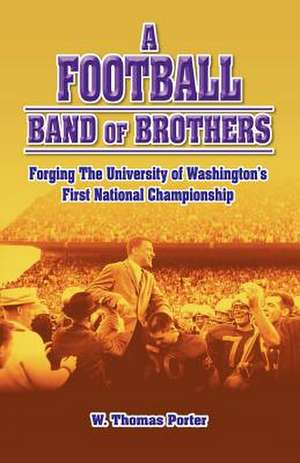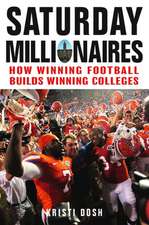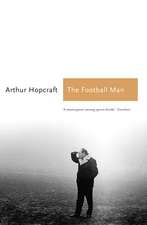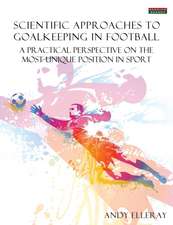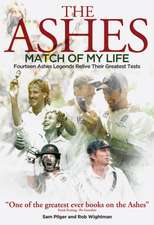A Football Band of Brothers
Autor W. Thomas Porteren Limba Engleză Paperback
Most members of the team played both offense and defense. Some had to work part-time to finance their education. The single ones lived with other students in dormitories and fraternity houses. Some were married and had children.
In 1955, Washington had been rocked by a player revolt which led to the firing of the head football coach. Disgruntled, he exposed a slush fund used by zealous boosters to directly pay players more than the Pacific Coast Conference allowed. The Husky athletic program was put on probation for two years along with Cal, UCLA and USC.
It was a difficult period for a once proud and successful program. Thirty-one year old George Briggs was hired as Athletic Director to clean up the mess and hire a new coach. Darrell Royal, a former All-America quarterback for the Oklahoma Sooners and the head coach at Mississippi State, accepted a four-year contract in 1956 and started the Husky football program on the road to recovery.
Royal's tenure was brief. After the 1956 season ended, Royal resigned to take his dream job at the University of Texas where he had a very successful career which included three national championships.
Briggs then hired 29-year old Jim Owens, a teammate of Royal and an All-America end. He had been a top assistant under Bear Bryant at Kentucky and Texas A&M. He was one of the architects of the "Junction Boys" ten days in hell that forged the Aggies' conference championship threeyears later.
Owens and his staff brought a philosophy that included an emphasis on team unity, defense, tough physical and mental conditioning, the use of the helmet to tackle and block and punish opponents, and a willingness to pay the price for success.
In 1958, the Huskies were mostly a bunch of sophomores - supposedly the youngest college team in America - and went 3-7.
Over the next two years, the Huskies forged the second best record of a collegiate football team in America - 20 wins and two losses. With 20 victories, one tie, and one loss, only Mississippi had a better resume. In 1959, they won the conference title, the first for Washington since 1936, and upset heavily favored Wisconsin in the 1960 Rose Bowl, 44-8. It was Washington's first Rose Bowl victory and brought respectability back to West Coast football.
Shortly after that game, Bud Wilkinson, Jim Owens' former coach, called to congratulate his former pupil on the stunning victory. He said, "It would be hard to find a club anywhere, anytime, that played a 60-miniute period any better than that team that day."
In the 1960 season, despite injuries to many key players including 1959 All-America quarterback and Hesiman hopeful, Bob Schloredt, the then senior-laden team again went 9-1. They had several fourth quarter come-from-behind win. They won four games by the combined margin of five points and became known as the "Cardiac Kids." With another Conference championship, they faced Minnesota in the 1961 Rose Bowl. The Gophers were the Associated Press' selection as the number one team in the country after the season ended.
In those days, most of the polls completed their final rankings beforethe bowl games were played. The Huskies beat the Gophers 17-7. The Husky coaches and players believed that the Rose Bowl was a championship bout and when you win a championship match, you get the title. Two polls - the Helms Foundation Poll founded in 1900 and the Football Writers Association of America Poll started in 1954 - announced their final rankings after the bowl games were completed. The FWAA selected Mississippi (10-0-1) as its national champion and the Helms Foundation selected Washington (10-1).
Jim Owens and his Husky band of brothers had gone from ashes to roses and a national championship and had, in the opinion of veteran football announcer, Keith Jackson, picked up the entire state and region and revitalized it.
The exploits of the 1959 and 1960 teams are the foundation of this very compelling story. The coaches and players really believed in the importance of team work. They believed that it took a whole team to get the job done. They believed that everybody was in the battle together. Since all of them played both ways, there was no offensive team, no defensive team, no special team. They could come together much more easily with only 50 players on the team. The coaches recruited players with integrity and character who didn't expect extra or different treatment. Nobody expected anything but hard work They made it through grueling practices and challenge and conditioning drills because of an intense determination and commitment to the goals of the coaches and to each other. The result of their shared experience, both on the practice field and in games with tough opponents, was a closeness unknown to outsiders.
They knew each other's background, wherethey came from, and what their capabilities were. They became a band of brothers ready to give up part of their individualism and quest for glory for the good of the team. They were committed to do whatever it took to win battles on the football field. Their success didn't lay so much in having the best talent. The difference was their resolve and "playing the game from the heart."
Preț: 117.21 lei
Nou
Puncte Express: 176
Preț estimativ în valută:
22.44€ • 24.38$ • 18.86£
22.44€ • 24.38$ • 18.86£
Carte disponibilă
Livrare economică 31 martie-14 aprilie
Preluare comenzi: 021 569.72.76
Specificații
ISBN-13: 9781425106621
ISBN-10: 1425106625
Pagini: 268
Dimensiuni: 140 x 216 x 16 mm
Greutate: 0.36 kg
Editura: Troubador Publishing
ISBN-10: 1425106625
Pagini: 268
Dimensiuni: 140 x 216 x 16 mm
Greutate: 0.36 kg
Editura: Troubador Publishing
